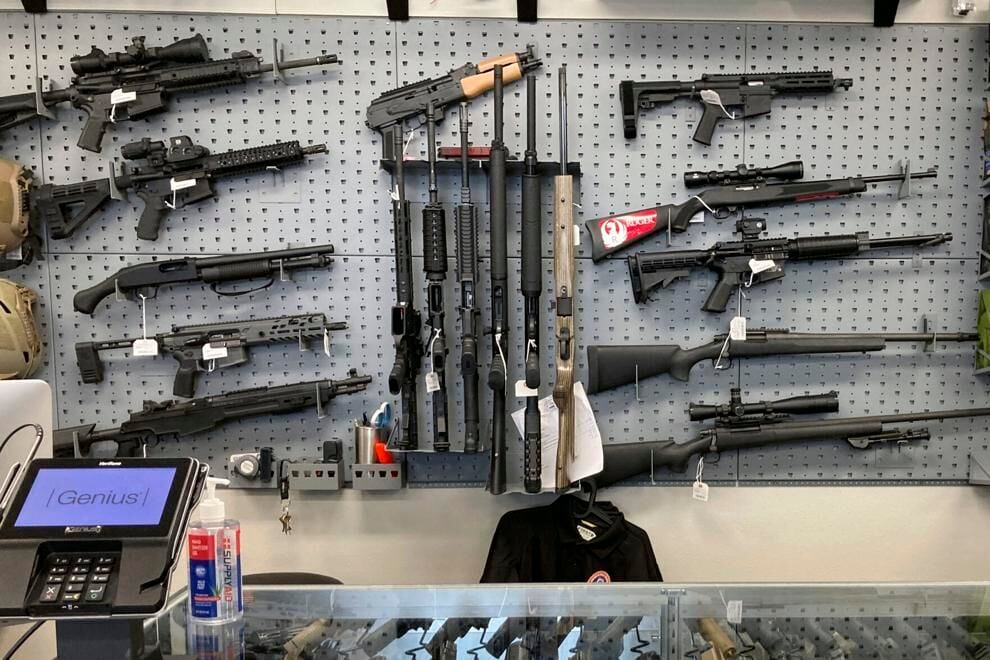Federal judge blocks Colorado law raising firearm-purchase age, lets waiting period take effect

FILE - Firearms are displayed at a gun shop in Salem, Ore., on Feb. 19, 2021. An Oregon court decided Wednesday, Feb. 15, 2023, that local governments can't declare themselves Second Amendment sanctuaries and ban police from enforcing certain gun laws within their borders. The opinion was the first court test of the concept, which hundreds of U.S. counties have adopted in recent years. Andrew Selsky - staff, AP
Andrew Selsky - staff, AP
A federal judge on Monday granted the request of two Colorado residents to block a new Colorado law generally raising the age limit for purchasing firearms to 21.
At the same time, in a separate lawsuit, U.S. District Court Chief Judge Philip A. Brimmer declined to bar enforcement of another recently-enacted law establishing a three-day waiting period for gun purchases.
Rocky Mountain Gun Owners challenged the constitutionality of Senate Bill 169, which took effect on Aug. 7 and created a misdemeanor offense for those who sell guns to people younger than 21. Similarly, it became a misdemeanor for someone under 21 to purchase a gun. The law created exceptions for police officers, those in the military or gifts from family members.
In addition to the gun-rights group, two Colorado residents who were between the ages of 18 and 21, Tate Mosgrove and Adrian S. Pineda, also joined the litigation.
Brimmer agreed the plaintiffs had shown a likelihood that they would prevail on their underlying claims and decided to bar the state from enforcing SB 169 while the case unfolds.
“The court agrees with the individual plaintiffs that the Second Amendment includes the right to acquire firearms and, therefore, protects the individual plaintiffs’ proposed conduct,” Brimmer wrote in an order granting the preliminary injunction.
Rocky Mountain Gun Owners has regularly sought to strike down gun safety laws following the U.S. Supreme Court’s 2022 decision in New York State Rifle & Pistol Association, Inc. v. Bruen. The court’s conservative majority laid down a new legal framework for analyzing the constitutionality of gun regulations broadly, scrapping the government’s ability to illustrate how a limitation on Second Amendment rights would advance a compelling public safety goal.
Instead, Bruen requires the government to show a restriction is “consistent with this Nation’s historical tradition of firearm regulation.”
Consequently, in contrast with other types of constitutional rights cases, the arguments over the legality of SB 169 unleashed dueling interpretations of history from the Founding Era through Reconstruction.
The plaintiffs argued the Second Amendment right to keep and bear arms also encompassed the right to “acquire arms.” At the Founding period, men under 21 routinely handled guns in their militia service, so a ban would have been incomprehensible.
“George Washington’s Continental Army consisted of thousands of young men under twenty-one and they regularly used firearms,” wrote attorney Barry K. Arrington. “Young males were commonly required to possess firearms as part of their militia service.”
That was only half of the story, the state countered. At the time, 18-to-20-year-olds were still considered “infants” who lacked full legal rights. Colorado produced lengthy statements from multiple academics who attested that there was no unconditional right to firearms for young men, and restrictions did exist.
“Rather, access to, and the ability to keep or bear, weapons occurred in supervised situations where minors were under the direction of those who enjoyed legal authority over them: fathers, guardians, constables, justices of the peace, or militia officers,” wrote Saul Cornell, a history professor at Fordham University.
Contemporary court decisions also revealed a split on the age question. The plaintiffs pointed to a federal judge’s recent ruling in Virginia that struck down an age restriction similar to Colorado’s on the grounds there was insufficient evidence such policies were part of the country’s historical tradition. Colorado responded with a Tennessee Supreme Court ruling from 1878 that endorsed an age restriction for 18-to-20-year-olds as “wise and salutary.”
And both sides directed Brimmer to the Atlanta-based U.S. Court of Appeals for the 11th Circuit for opposite reasons. This year, a three-judge panel upheld Florida’s 21-year-old age limit on firearm purchases, only to have the entire court vacate the decision last month, pending a rehearing.
Brimmer, an appointee of George W. Bush, noted Rocky Mountain Gun Owners itself had not established how it or its members would suffer injury from SB 169. Therefore, only Mosgrove and Pineda could seek an injunction as prospective gun purchasers.
Brimmer agreed the Second Amendment covers 18-to-20-year-olds and it protected Mosgrove and Pineda’s right to obtain guns for self-defense. Therefore, Colorado had to justify SB 169 with historical tradition. Based on the government’s cited regulations, many of which were dissimilar to SB 169 or came long after the Founding, Brimmer concluded Colorado had not met its burden.
Colorado “fails to point to any evidence during the founding era that a total prohibition on the sale of firearms to minors was consistent with the right to bear arms,” Brimmer wrote.
“Since the day this legislation was introduced, we knew it was unconstitutional,” said Taylor Rhodes, executive director of Rocky Mountain Gun Owners, in a statement.
Brimmer’s preliminary injunction bars enforcement of SB 169 until he can render a final decision in the case. Since the Bruen ruling, lawsuits against gun safety laws have produced mixed results. While local bans on “assault weapons” in Boulder County are on hold, judges have also upheld laws criminalizing gun possession in certain circumstances.
Separately, Brimmer is handling another lawsuit from Rocky Mountain Gun Owners to strike down House Bill 1219, which established a three-day waiting period for gun purchases from firearm dealers. Also on Aug. 7, he issued an order rejecting a preliminary injunction against the law. Neither Rocky Mountain Gun Owners nor the individual plaintiff, Alicia Garcia, demonstrated an imminent injury from the policy.
The case is Rocky Mountain Gun Owners et al. v. Polis.
Editor’s note: This article has been updated to clarify the description of SB 169.






